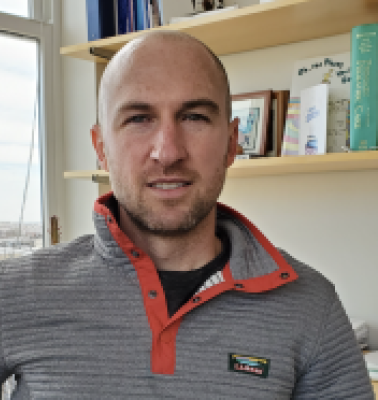UNC Gillings School to host new CDC center for outbreak forecasting, response
September 19, 2023
Today, the UNC Gillings School of Global Public Health was named one of 13 funded partners working alongside the Centers for Disease Control and Prevention (CDC) to establish the Outbreak Analytics and Disease Modeling Network (OADM) – an important step towards creating a nationwide outbreak resource to support more effective responses during public health emergencies.
Each funded partner will provide support in innovation, integration or implementation for outbreak analytics, disease modeling and forecasting. The Gillings School will receive yearly funding of $4.5 million for five years to support the creation of the Atlantic Coast Center for Infectious Disease Dynamics and Analytics (ACCIDDA), which will support the CDC’s Center for Forecasting and Outbreak Analytics as the OADM Coordinating Center and as a Center of Innovation.

Dr. Justin Lessler
“These centers will create a national network to provide data and modeling support to public health responders as they prepare for future infectious disease outbreaks,” said Justin Lessler, co-lead of ACCIDDA and professor of epidemiology at the Gillings School. “We want to ensure that, the next time an incident like COVID-19 happens, there are known and trusted sources for modeling and data analysis that can produce relevant and valid projections.”

Dr. Kimberly Powers

Dr. Shaun Truelove
ACCIDDA will be led by Lessler and Kim Powers, associate professor of epidemiology at the Gillings School, along with Shaun Truelove, assistant scientist in international health and epidemiology at the Johns Hopkins Bloomberg School of Public Health. Additional collaborating institutions include the Johns Hopkins Applied Physics Laboratory, the University of Florida and the University of Pittsburgh School of Medicine. Jennifer Anderson at the Gillings School and Erica Carcelén at Johns Hopkins Bloomberg School of Public Health will serve as ACCIDDA’s project managers.
Over the next five years, ACCIDDA will function in two capacities.
The first: As a Center of Innovation for the OADM, where, as one of the CDC’s 13 partners, the team will support the creation of a pipeline for new analytical methods, tools and platforms for modeling efforts that can be used to provide information to public health decision-makers.
The second: As the Coordinating Center, which will oversee coordination of efforts and the transition of analytical methods between the 13 funded partners in the OADM.
“The goal is to provide reliable modeling and response tools for public health agencies to respond to various types of potential outbreaks, like Mpox or COVID-19,” Powers said. “One of the innovations our center plans to focus on is finding ways to take projections at the national or state level and make them relevant to smaller communities, particularly those that are rural or marginalized who need a customized public health approach.”
“This new center and network will build on the tremendous amount of work and collaboration to apply disease modeling and analytics for direct public health response and decision-making,” said Truelove. “We are extremely excited to continue adding to our toolkit through innovation, increasing our workforce through training of new experts, and building capacity across the US through expanded engagement with public health organizations.”
“Each of the grantees will help us move the nation forward in our efforts to better prepare and respond to infectious disease outbreaks that threaten our families and our communities,” said Dylan George, director of the CDC Center for Forecasting and Outbreak Analytics. “We are committed to working alongside these outstanding partners to achieve our goal of using data and advanced analytics to support decision-makers at every level of government.”
The center will launch on Sept. 29. Over the first two years of the project, the ACCIDDA center will establish new data resources to ensure timely information is available in a public health emergency, develop innovative new methods for predicting epidemics, deepen relationships with public health departments and help train a new generation of infectious disease epidemiologists. These efforts will include establishment of an online cohort for ongoing tracking of infectious disease outcomes and the leveraging of emerging AI technologies to improve the timeliness and local relevance of infectious disease analytics.
Contact the UNC Gillings School of Global Public Health communications team at sphcomm@unc.edu.
